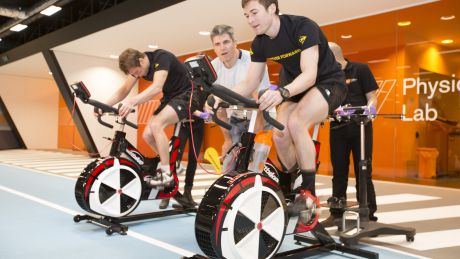Is stress affecting my performance?
Professor Vincent Walsh, the head of UCL’s institute of cognitive neuroscience, says you can train to make better decisions under stress

People have always tried to draw a distinction between the physical and mental states. However, there’s plenty of evidence to suggest that physical depletion really has an affect on your ability to make decisions and vice versa. When you’re operating at the very top end of your abilities, your performance is really dependant on your mental state. Every athlete is thinking about what they’re doing to some degree and if you’re dealing with immediate or long-term stresses that’s going to effect how you execute really simple things.
The good news is that you can learn to improve how you handle stress. But when I say ‘learn’, there’s nothing you can get from a book or the internet that’ll help you become better at it. If you want to improve your performance you’ve got to go out and train in situations that are stressful and have consequences, which is what we looked at in a study for Dunlop Tyres. This is something professional athletes do all the time. There are things that can be practised, things that affect your skills that you can put into operation.
For example, it might be a good idea to do your technical sessions after you’ve drained yourself with a sprint session. In training you need to put yourself under the same kind of physical pressure you’ll be under at the end of a game or race. That way you get used to making decisions under physical pressure.
Handling stress in sports is all about how well you can make decisions under pressure. There are two fairly common misconceptions about decision-making. First that it’s a single thing, rather than a process. And second that it’s purely influenced by psychological effects.
You can quickly demonstrate the second one on an exercise bike or treadmill. Ever tried to work out how long you’ve got left or your speed when you’re exhausted? When you’re really pushing it, your ability to do that simple mental arithmetic is blown away.
This is one of the reasons you’ll sometimes see top athletes making basic errors in important situations – they’re trying to deal with mental pressure on the fly rather than having a plan. The people who thrive on that competition on the day are the ones who’ve trained in those situations already so that they can understand and respond to it.
Two-step stress relief
‘You can improve how you deal with stress, and therefore your performance, in a matter of hours,’ says Walsh. ‘There are two simple things that will immediately make a difference.’
Sign up for workout ideas, training advice, reviews of the latest gear and more.
Glucose check
‘The first thing to address is glucose. The more you deplete that, the more your physical and mental capabilities are hampered.’ When you’re depleted, replenish with unprocessed carbs – potatoes and rice will work.
Quick response
‘You need automatic response patterns to deal with issues. For example, if you go 30-love down in a tennis match, you should already know your response. Perhaps it’s to drag out the rallies and make your opponent run. But if you’re trying to think and play, then both will suffer.’
Can you perform in that one moment that decides everything? For more information on Dunlop Tyres’ exclusive study visit dunlopmindset.com
Coach is a health and fitness title. This byline is used for posting sponsored content, book extracts and the like. It is also used as a placeholder for articles published a long time ago when the original author is unclear. You can find out more about this publication and find the contact details of the editorial team on the About Us page.

